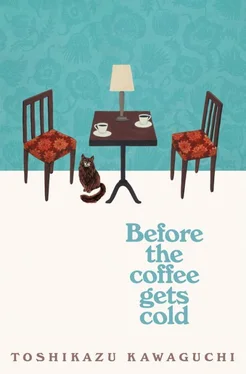This was the first time that Kohtake had seen Kei upset like this. As a nurse, she understood the real danger that she faced in attempting to bear a baby with her heart condition. Her body had already become this frail while she was still just approaching the morning sickness phase. If she had chosen not to have the baby, no one would have blamed her, but she had decided to go ahead.
‘But I’m really scared,’ Kei muttered in a trembling voice. ‘I wonder if my child will be happy.
‘Will Mama’s baby be lonely? Will that make you cry?’ She talked to the child as she always did. ‘I might only be able to have you, my child. Will you forgive me?’
She listened, but no answer came.
A stream of tears flowed down her cheek.
‘I’m scared… the thought of not being there for my child is frightening,’ she said, looking directly at Nagare. ‘I don’t know what I should do. I want my child to be happy. How can such a simple wish be so terribly scary?’ she cried.
Nagare gave no reply. He just gazed at the paper cranes on the counter.
Flap.
The woman in the dress closed her novel. She hadn’t finished it: a white bookmark with a red ribbon tied to it was left inserted between the pages. Hearing the book close, Kei looked over at her. The woman in the dress looked back at Kei and just went on staring at her.
With her eyes fixed on Kei, the woman in the dress gently blinked just once. Then she smoothly got up from her seat. It was as if that blink had been meant to communicate something, yet she walked behind Nagare and Kohtake and disappeared into the toilet as if she was being drawn inside.
Her seat – that seat – was vacant.
Kei started walking towards the seat as if something was pulling her there. Then once in front of that seat – the one that can send you to the past – she stood staring at it.
‘Kazu… could you make some coffee, please?’ she called weakly.
Hearing Kei’s request, Kazu poked her head from the kitchen and saw her standing next to that seat. She had no idea what was on Kei’s mind.
Nagare turned round and saw Kei’s back. ‘Oh, come on… You’re not serious?’ he said.
Kazu spotted that the woman in the dress was gone, and remembered the conversation from earlier that day. Fumiko Kiyokawa had asked, ‘Could you visit the future too?’
Fumiko’s wish was simple: she wanted to know whether or not in three years, Goro had returned from America and they were married. Kazu had said that it could be done but that no one decided to go because it was pointless. But that was exactly what Kei wanted to do.
‘Just one look is all I want.’
‘Hang on.’
‘If I could see, for just a moment, that would be enough…’
‘Do you seriously intend on going to the future?’ Nagare asked, his tone gruffer than usual.
‘It’s all I can do…’
‘But you don’t know if you can meet?’
‘…’
‘What’s the point of going there if you don’t meet?’
‘I understand that, but…’
Kei looked pleadingly into Nagare’s eyes.
But Nagare could only produce one word. ‘No,’ he said. He turned his back on Kei and withdrew into silence.
Nagare had never before stood in the way of Kei doing anything. He respected her insistent and determined personality. He didn’t even argue strongly against her decision to put her life on the line to have a child. But he objected to this.
He wasn’t just concerned with whether or not she would have her child. He thought that if she went into the future and discovered that the child didn’t exist, the inner strength that had been sustaining her would be destroyed.
Kei stood before the chair, weak but desperate. She couldn’t walk away from her decision. She was not going to retreat from her position in front of that chair.
‘I need you to decide how many years into the future,’ Kazu said suddenly. She slid beside her and cleared away the cup that the woman in the dress had been drinking from.
‘How many years? And what month, date, and time?’ she asked Kei. She looked directly into Kei’s eyes and gave a small nod.
‘Kazu!’ Nagare shouted with all the authority he could muster. But Kazu ignored him and with her trademark cool expression said, ‘I will remember. I will make sure you can meet…’
‘Kazu, sweetheart.’
Kazu was promising her that she would make sure her child would be there in the cafe at the time that she chose to go to in the future. ‘So you don’t have to worry,’ she said.
Kei gazed into her eyes and gave a little nod.
Kazu had a feeling that the deterioration in Kei’s condition over the past few days wasn’t down to the physical changes from the pregnancy alone, but that it had also been caused by the overall stress of the situation. Kei wasn’t afraid to die. Her anxiety and sadness stemmed from the thought of not being there to see her child grow up. This weighed heavily on her heart, and was sapping her physical strength. As her strength faded, her sense of anxiety grew. Negativity is food for a malady, one might say. Kazu feared that if Kei continued on this course, her condition would continue to weaken as the pregnancy progressed and the lives of both mother and child might be lost.
A glimmer of positivity returned to Kei’s eyes.
I can meet my child.
It was a very, very small hope. Kei turned to look at Nagare sitting at the counter. Her eyes locked with his.
He was silent for a moment but with a short sigh, he turned away. ‘Do as you wish,’ he said, turning on his stool so that his back was to her.
‘Thank you,’ she said to his back.
After making sure that Kei was able to slide in between the table and the seat, Kazu took the cup that the woman in the dress had used and disappeared into the kitchen. Kei inhaled deeply, slowly lowered herself into the seat, and closed her eyes. Kohtake held her hands together in front of her as if in prayer, while Nagare stared silently at the paper cranes in front of him.
This was the first time Kei had seen Kazu defy Nagare’s will. Outside the cafe, Kazu rarely felt comfortable talking with anyone she hadn’t met before. She went to Tokyo University of the Arts, but Kei had never seen her with anyone you might describe as a friend. She normally kept to herself. When not in university, she helped out at the cafe, and when that was finished, she retired to her room, where she would work on her drawings.
Kazu’s drawings were hyper-realist. Using only pencils, she created works that appeared as true to life as actual photographs, but she could only draw things she could observe herself; her drawings never depicted the imaginary or the invented. People don’t see things and hear things as objectively as they might think. The visual and auditory information that enters the mind is distorted by experiences, thoughts, circumstances, wild fancies, prejudices, preferences, knowledge, awareness, and countless other workings of the mind. Pablo Picasso’s sketch of a nude man that he did at age eight is remarkable. The painting he did at age fourteen of a Catholic communion ceremony is very realistic. But later, after the shock of his best friend’s suicide, he created paintings in shades of blue that became known as the Blue Period. Then he met a new lover and created the bright and colourful works of the Rose Period. Influenced by African sculptures, he became part of the cubist movement. Then he turned to a neoclassical style, continued on to surrealism, and eventually painted the famous works The Weeping Woman and Guernica .
Taken together, these artworks show the world as seen through Picasso’s eyes. They are the result of something passing through the filter that is Picasso. Until now, Kazu had never sought to challenge or influence people’s opinions or behaviour. This was because her own feelings didn’t form part of the filter through which she interacted with the world. Whatever happened, she tried not to influence it by keeping herself at a safe distance. That was Kazu’s place – it was her way of life.
Читать дальше












